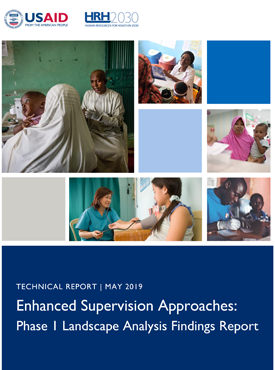In many low- and middle-income countries, health systems face shortages of qualified health workers, and decision-makers lack the data and tools needed to optimize existing resources.

Enhanced Supervision Approaches: Phase 1 Landscape Analysis Findings Report .
Paper | May 31, 2019

USAID’s Human Resources for Health in 2030 (HRH2030) program conducted a landscape analysis of studies documenting supervision interventions, enhancements, and approaches to improve health worker performance while identifying components associated with their effectiveness.
Structured by a conceptual framework and taxonomy to classify the inputs, processes, and results for 45 documented supervision approaches, HRH2030 elaborated findings from the analysis, as well as two case studies of most promising approaches. This work is presented as both a summary report and as a taxonomy of approaches for use and reference by health sector managers, leaders, planners, and other stakeholders. The key components of supervision approaches supported integration, scalability, and sustainability. To achieve the landscape analysis objective, HRH2030 undertook a database search to gather evidence of supervision approaches, and reviewed findings according to defined criteria and analyzed according to the conceptual framework. The resulting inventory of approaches was classified according to a more detailed taxonomy and analyzed to produce findings. Finally, virtual deep dives of two of the most promising supervision approaches were conducted to further detail implementation.
